|
|
|
ADVERTISEMENTS
|
|
PREMIUM
- HAPPY HOLIDAYS!
- Siliconeer Mobile App - Download Now
- Siliconeer - Multimedia Magazine - email-Subscription
- Avex Funding: Home Loans
- Comcast Xfinity Triple Play Voice - Internet - TV
- AKSHAY PATRA - Bay Area Event - Sat. Dec 6
- Calcoast Mortgage - Home Loans
- New Homes in Silicon Valley: City Ventures - Loden Place - Morgan Hill
- Bombay to Goa Restaurant, Sunnyvale
- Buying, Sellling Real Estate in Fremont, SF Bay Area, CA - Happy Living 4U - Realtor Ashok K. Gupta & Vijay Shah
- Sunnyvale Hindu Temple: December Events
- ARYA Global Cuisine, Cupertino - New Year's Eve Party - Belly Dancing and more
- Bhindi Jewellers - ROLEX
- Dadi Pariwar USA Foundation - Chappan Bhog - Sunnyvale Temple - Nov 16, 2014 - 1 PM
- India Chaat Cuisine, Sunnyvale
- Matrix Insurance Agency: Obamacare - New Healthcare Insurance Policies, Visitors Insurance and more
- New India Bazar: Groceries: Special Sale
- The Chugh Firm - Attorneys and CPAs
- California Temple Schedules
- Christ Church of India - Mela - Bharath to the Bay
- Taste of India - Fremont
- MILAN Indian Cuisine & Milan Sweet Center, Milpitas
- Shiva's Restaurant, Mountain View
- Indian Holiday Options: Vacation in India
- Sakoon Restaurant, Mountain View
- Bombay Garden Restaurants, SF Bay Area
- Law Offices of Mahesh Bajoria - Labor Law
- Sri Venkatesh Bhavan - Pleasanton - South Indian Food
- Alam Accountancy Corporation - Business & Tax Services
- Chaat Paradise, Mountain View & Fremont
- Chaat House, Fremont & Sunnyvale
- Balaji Temple - December Events
- God's Love
- Kids Castle, Newark Fremont: NEW COUPONS
- Pani Puri Company, Santa Clara
- Pandit Parashar (Astrologer)
- Acharya Krishna Kumar Pandey
- Astrologer Mahendra Swamy
- Raj Palace, San Jose: Six Dollars - 10 Samosas
CLASSIFIEDS
MULTIMEDIA VIDEO
|
|
|
|
|
NEWS DIARY
Bangladesh Mutiny Ends, Death Toll Over 70 | Indian Economy in Sharp Slowdown, Data Shows | British Peer Jailed for Motorway Texting | Nano Launch | Palace Opened | Lanka March | Taliban Ceasefire | Islamists Held | Bomb Kills 30 | Rebel Planes Raid
Bangladesh Mutiny Ends, Death Toll Over 70
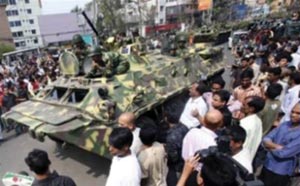 An armored vehicle enters the Bangladesh Rifles headquarters in Dhaka. An armored vehicle enters the Bangladesh Rifles headquarters in Dhaka.
Bangladesh Prime Minister Sheikh Hasina drew praise for bringing a swift end to a mutiny by paramilitary troops who slaughtered scores of their officers accounting for most of a death toll now put at more than 70.
The mutiny was the first major test of Hasina — who investors and foreign donors had hoped would bring stability to Bangladesh — since she took office last month after two years of emergency rule by an army-backed government.
“Premier Hasina has tackled a huge problem efficiently and saved the nation from what could be a disaster. She has proved her resolve, personal credibility and leadership,” said retired Major-General Syed Mohammad Ibrahim, a defense analyst.
The mutiny in Dhaka ended after the rebels handed over their weapons following an amnesty offer and an appeal by Hasina to return to the barracks.
But the deaths came earlier as disgruntled Bangladesh Rifles border guard troops, at a meeting over pay and command disputes, opened fire on their officers, drawn from the regular army.
Among the dead was the chief of the paramilitary force, Major-General Shakil Ahmed, and the government named Brigadier-General Moinul Hossain as his successor.
A fire service official who declined to be named said more than 50 bodies had been recovered from the BDR headquarters complex, which would take the death toll to more than 70, most BDR officers but including at least four civilians.
Estimates of the dead have varied widely since a government minister put the figure at 50 on Wednesday. It could eventually climb past 100 as scores of BDR officers are still missing.
“Bodies have been stuffed into manholes, thrown into ponds and tanks, while those alive were hiding even in dirty sewer drains,” said Atiqul Islam, a Dhaka University student who had a relative among the dead.
|TOP|
Indian Economy in Sharp Slowdown, Data Shows
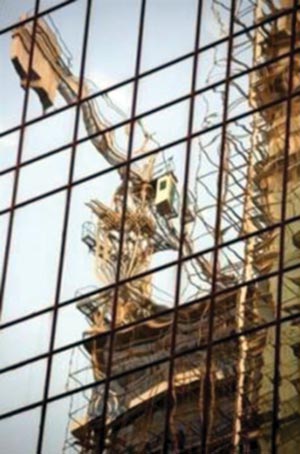 An Indian construction crane is reflected in a completed building in Gurgaon on the outskirts of New Delhi, 2008. India’s economy grew at its slowest pace in nearly six years. An Indian construction crane is reflected in a completed building in Gurgaon on the outskirts of New Delhi, 2008. India’s economy grew at its slowest pace in nearly six years.
India’s government may have to revise its growth forecast. India’s economy grew by less than expected in the last three months of 2008, official figures have shown.
The country’s gross domestic product grew by 5.3 percent, compared with 7.6 percent in the previous three months and 8.9 percent in the same period a year earlier.
Agriculture, which makes up about a fifth of the economy, was one of the sectors to see growth fall.
The global recession has cut demand for exports, and economists are calling for further measures to boost growth.
These have included a clamor for further interest rate cuts.
The data saw India’s main stock exchange index, the Sensex, fall by 2 percent.
Observers say the data will come as a blow to the Congress-led government, which faces general elections by May.
It has predicted that the economy, which grew by 9 percent overall to March 2008, will expand by 7.1 percent in the 12 months to March this year.
However analysts say this will probably be revised down.
The sharp slowdown in both China and India, which have been among the world’s fastest-growing economies, will have a significant impact on the world economy, with the major industrial countries already mired in recession.
India’s economy is Asia’s third-largest, and is largely driven by domestic demand. It has seen strong growth of 9 percent or more in the past three years.
But the slowdown has “dismissed speculation India is more resilient in this global turmoil because its economy is more domestically oriented,” said Sherman Chan, an economist at Moody’s Economy.com.
|TOP|
British Peer Jailed for Motorway Texting
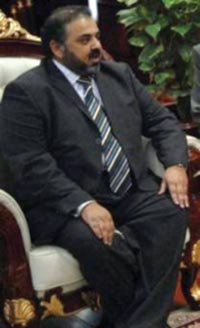 Lord Nazir Ahmed Lord Nazir Ahmed
A Labor peer who sent and received text messages minutes before he was involved in a fatal crash on the M1 has been jailed for 12 weeks.
Lord Ahmed, 51, was driving his Jaguar when he hit a stationary car in the outside lane of the motorway - Martyn Gombar, 28, was killed.
Lord Ahmed, of Rotherham, had admitted driving dangerously.
Mr Justice Wilkie said: “It’s clear the dangerous driving had no causal link to the accident.”
The peer also faces expulsion from the Labor Party following his jail sentence.
A Labor Party spokesman said: “The Labor Party does not comment on individual cases, but under the party’s rules any member who receives a custodial sentence is subject to automatic exclusion.”
The crash happened near junction 35 of the southbound carriageway at Rotherham on Christmas Day 2007.
Gombar, who was Slovakian, was living in Leigh, Greater Manchester, at the time of his death. He had crashed into the central reservation, leaving his Audi facing the wrong way in the third lane of the motorway.
One motorist had already clipped his car and another had to take evasive action to avoid it.
The court had heard how Lord Ahmed sent and received a series of five text messages while driving in the dark at speeds of, and above, 60 mph along a 17-mile stretch of the motorway.
Mr Justice Wilkie made clear the texting incident had no bearing on the fatal collision.
But he added: “It is of the greatest importance that people realize what a serious offence dangerous driving of this type is.
“I have come to the conclusion that by reason of the prolonged, deliberate, repeated and highly dangerous driving for which you have pleaded guilty, only an immediate custodial sentence can be justified.”
|TOP|
Nano Launch
 India’s Tata Motors announced Thursday the snub-nosed Nano, billed as the world’s cheapest car, will be launched next month. India’s Tata Motors announced Thursday the snub-nosed Nano, billed as the world’s cheapest car, will be launched next month.
The Nano, billed as the world’s cheapest car, will be launched March 23, its manufacturer, India’s Tata Motors Ltd. said in a statement.
The ultra-cheap 100,000 rupee ($2,082) car will be launched at an event in Mumbai and will be displayed at Tata Motors’ dealerships across the country from the first week of April, the statement said. The company will start taking orders for the car from the second week of April.
Violent farmer protests had forced Tata Motors to shut down its factory in West Bengal state and relocate to the western state of Gujarat last year, delaying its planned launch at the end of 2008.
The farmers felt they had been unfairly compensated when the government had acquired 1,000 acres from them and handed it over to Tata Motors for the Nano factory. Such land conflicts have become increasingly common as India struggles to industrialize without leaving millions of subsistence farmers behind.
Tata Motors is a part of the Tata Group, one of India’s oldest and largest conglomerates.
|TOP|
Palace Opened
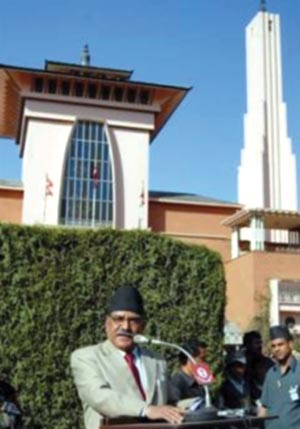 The palace of Nepal’s ousted king has been thrown open to the public. The palace of Nepal’s ousted king has been thrown open to the public.
The palace of Nepal’s ousted king has been thrown open to the public as a museum, giving ordinary people a peek at the lavish lifestyle and murderous past of their former rulers.
The Shah dynasty ruled Nepal for 240 years, but was abolished last May after Maoist rebels and mainstream parties signed a peace deal and joined forces against the unpopular King Gyanendra.
The former monarch now lives in the suburbs of Kathmandu.
Among the major attractions of the Narayanhiti museum are a gold-and-silver crafted ceremonial throne, banquet halls and even the ex-king’s bedrooms.
The museum, which will progressively open more rooms to the public as work continues, is also set to display a diamond and emerald adorned crown and scepter, and a Mercedes-Benz given to Gyanendra’s grandfather by Adolf Hitler.
“This shows the massive disparity between the life of a common Nepalese person and the king. Their lifestyle justifies our starting the people’s war,” said Nanda Kishore Pun, a former Maoist rebel visiting the museum.
In a conflict that left at least 13,000 dead, Maoists fought the Royal Nepal Army for 10 years before signing a peace deal.
Nepal’s Prime Minister Prachanda, the leader of the Maoists, hailed the museum opening as “one step forward towards institutionalizing the republic.”
“It’s a victory of the people against feudalism,” he said.
|TOP|
Lanka March
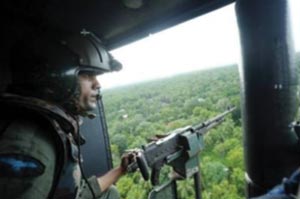 A Sri Lankan gunner scans the horizon during military operations over Mullaittivu. A Sri Lankan gunner scans the horizon during military operations over Mullaittivu.
Sri Lankan forces entered the last town under rebel control, the military said, as the government brushed aside international calls for a cease-fire to allow tens of thousands of civilians to escape the war zone.
In recent months, the military has driven the Tamil Tigers out of their major strongholds in the north and confined them to a small patch of coastal land along the northeast. The government has vowed to destroy the rebels and end the 25-year-old civil war plaguing this island nation.
After breaching rebel defenses, troops entered the edge of Puthukkudiyiruppu and were fighting house-to-house battles with small groups of rebels on the outskirts of the town, military spokesman Brig. Udaya Nanayakkara said.
“They are resisting and retreating,” Nanyakkara said of the rebel fighters.
The town’s capture would be another devastating blow to the already reeling rebels and their dreams of creating an independent state in the north and east. The guerrillas, who controlled a wide swath of the north less than a year ago, would be left with little more than a handful of tiny villages and a small strip of coast.
Aid groups estimate as many as 200,000 civilians are trapped in the shrinking rebel area, and Human Rights Watch said 2,000 have been killed in recent months and accused both sides of committing war crimes.
The Tamil Tigers accused the military of launching artillery into a government-declared “safe zone” inside rebel-held territory in an attack that killed at least 10 civilians and wounded 25 others. More than 30 civilians were killed in fighting earlier, the rebels said in a posting on their Web site.
|TOP|
Taliban Ceasefire
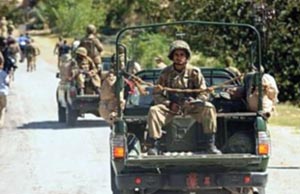 Pakistani troops patrol in the troubled Bajaur agency in 2008. Pakistani troops patrol in the troubled Bajaur agency in 2008.
A Taliban commander has announced a unilateral cease-fire in a northwestern Pakistan region where the military says it has killed around 1,500 militants in an continuing offensive.
The military was not available for comment on the Taliban’s move in Bajur region, which is a major transit route for militants traveling to fight U.S. and NATO forces in neighboring Afghanistan.
It follows the introduction of an already week-old cease-fire between the government and militants in the Swat Valley, another northwestern region, in support of a peace process there.
The United States and other Western governments have criticized the Swat truce and negotiations, saying they could create a safe haven for al-Qaida and Taliban in the region.
Unlike in Swat, the Taliban in Bajur had been losing ground in recent months, most analysts say, and the military has several times claimed to be close to victory.
Taliban commander Maulvi Faqir Mohammad, announced the ceasefire in a radio broadcast.
“We have decided to observe a ceasefire,” he said. “I direct all of my fighters to stop armed actions against the government,” he said. “We will take strict action against anyone who violates the order.”
Pakistan is under intense international pressure to crack down on al-Qaida and Taliban militants in the northwest blamed for increasing attacks in Afghanistan and Pakistan. U.S. officials also fear the region is being used to plan terrorist attacks on the West.
Earlier, the paramilitary Frontier Corps in Bajur announced it had captured the Bhaichina Heights from militant control, which it said had great tactical importance to the extremists. It was unclear if Mohammad’s announcement was related to that operation.
|TOP|
Islamists Held
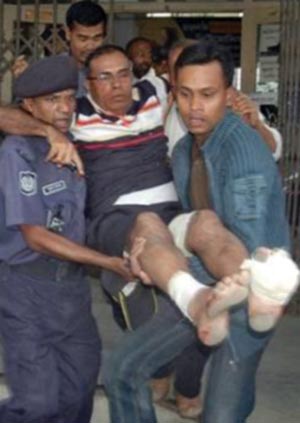 A police officer and a colleague carry an unidentified injured journalist after treatment in Gazipur, Dhaka, Bangladesh. A grenade seized from suspected Islamic militants exploded during a news conference at a police station in Bangladesh. A police officer and a colleague carry an unidentified injured journalist after treatment in Gazipur, Dhaka, Bangladesh. A grenade seized from suspected Islamic militants exploded during a news conference at a police station in Bangladesh.
Police in Bangladesh arrested four suspected members of a banned Islamic militant group Saturday.
The arrests followed a raid on a house in Gazipur district, about 20 miles north of the capital Dhaka, police official Nazmul Islam Khan said.
The suspects — three men and a woman — are believed to be members of Jumatul Mujahedeen Bangladesh, he said. The group has campaigned for years to establish Islamic Sharia law in Muslim-majority Bangladesh, a nation of 150 million people and governed by secular laws.
Bombings by the group across the nation have killed 26 people and wounded dozens more since August 2005.
Authorities said the organization fell apart when six top members were hanged in 2007. But local media reports say it is trying to regroup.
The arrests came a day after a suspected Jumatul Mujahedeen Bangladesh member detonated a grenade during a press conference at the office of the local police chief in Gazipur.
The grenade exploded when the man and three other suspects were being paraded before the media along with seized grenades and bomb-making materials. The suspect suddenly grabbed one of the grenades and detonated it, injuring 15 people including three journalists.
|TOP|
Bomb Kills 30
A suicide bomber blew himself up at a funeral for a slain Shiite leader in northwest Pakistan, killing 30 people and wounding more than 60, police and witnesses said. Three other people were killed in sectarian rioting sparked by the attack.
No one claimed responsibility, but the blast bore the hallmarks of Sunni extremists blamed for a string of other bloody strikes against Pakistan’s Shiite minority in recent months.
The spike in sectarian violence is adding to the sense of crisis in the nuclear-armed country as it grapples with rising attacks by al-Qaida and Taliban militants based in tribal lands close to the Afghan border.
Witnesses said the suicide bomber barged into a 1,000-strong crowd streaming toward a graveyard in Dera Ismail Khan and then detonated his explosives. The crowd was mourning Sher Zeman, a Shiite leader who was gunned down in the city the day before.
The blast left bodies, shoes and torn clothing littering the bloodstained street. Some of the dead and wounded were taken to hospitals in wooden handcarts because there were not enough ambulances.
Soon after, gunfire broke out and angry Shiites fired on police officers rushing to the scene, said police official Ishtiaq Marwat. One public bus was torched by rioters.
At least 30 people were killed in the blast, while three more were shot dead in the riots, said Dr. Farid Mahsud, who was treating some of the more than 60 wounded at the city’s main hospital. By nightfall, troops patrolling the streets had restored order, said police official Nemat Ullah.
|TOP|
Rebel Planes Raid
Two rebel aircraft launched a surprise raid on the Sri Lankan capital, an act of defiance by the beleaguered Tamil Tiger rebels in the face of a punishing military offensive in the north.
The military shot down both planes, one of which crashed into a government office building, killing one person and wounding more than 40 others.
The raid was an embarrassment for the government, which has driven the rebels out of most of their northern strongholds and said it was on the verge of destroying the group.
The attack was the first air raid here since the rebels bombed a power station on the outskirts of the city in October.
The military said two weeks ago that it had captured the rebels’ last hidden airstrip in the north, effectively grounding its tiny air force. But the raid proved the Tamil Tigers retain the ability to launch paralyzing attacks across the country even as their ground forces are under siege in a small patch of territory in the northeast.
Two of the rebels’ planes approached the capital just after 9:30 p.m., military spokesman Brig. Udaya Nanayakkara said.
The government immediately shut off all power in the capital, and searchlights criss-crossed the sky. Anti-aircraft fire rippled across the city, tracer rounds flew overhead and flares lit up the night.
|TOP|
|
|
|
|
|
|